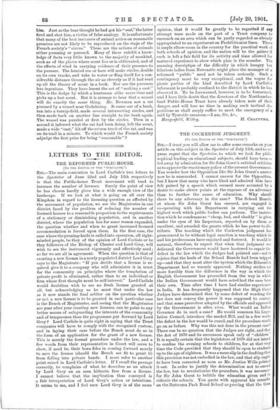LETTERS TO THE EDITOR.
THE REFORMED PUBLIC-HOUSE.
[To THE EDITOR OF THE "SPECTATOR."]
SiR,—The main contention in Lord Carlisle's two letters to the Spectator of June 22nd and July 13th respectively is that the Public-house Trust movement will tend to increase the number of licenses. Surely the point of view he has chosen hardly gives him a wide enough view of the landscape. If we look at what is going on all over the Kingdom in regard to the licensing question as affected by the movement of population, we see the Magistrates in one district faced by the problem of reducing the number of licensed houses to a reasonable proportion to the requirements of a stationary or diminishing population, and in another district, where the population has for some reason expanded, the question whether and when to grant increased licensed accommodation is forced upon them. In the first case, the case where the pruning-knife is called into operation, all right- minded people, be they of the opinion of Lord Carlisle or be they followers of the Bishop of Chester and Lord Grey, will wish to see the instrument vigorously and effectively used ; so far we are all in agreement. When the question is that of creating a new license in a newly populated district Lord Grey says to the Magistrate: "If you decide that a license is re- quired give it to a company who will administer it in trust for the community on principles where the temptation of private profit is eliminated, rather than to an individual or firm whose first thought must be self-interest." Lord Carlisle would doubtless wish to see no fresh license granted at all, but acknowledging as he must that under the law as it now stands the final arbiter on the question whether or nct a new license is to be granted in each particular case is the Bench of Magistrates, and seeing that the Magistrates are year after year creating new licenses, can he point to any better means of safeguarding the interests of the community and of temperance than the programme put forward by Lord Grey ? Lord Carlisle is quite right in saying that the Trust companies will have to comply with the recognised custom, and in laying their case before the Bench must do so in the form of an application for the grant of a new license. This is merely the formal procedure under the law, and a few words from their representative in Court will serve to show, if need be, their bona fides in coming forward merely to save the license (should the Bench see fit to grant it) from falling into private hands. I must refer to another point raised in Lord Carlisle's letter. If I recall the passage correctly, he complains of what he describes as an attack by Lord Grey on an area hitherto free from a license. I cannot believe that the implication thus conveyed is a fair interpretation of Lord Grey's action or intentions. It seems to me, and I feel sure Lord Grey is of the same
opinion, that it would be greatly to be regretted if any attempt were made on the part of a Trust company to encroach on an area which can be justly regarded as already appropriated to an experiment on Prohibitionist lines. There is ample elbow-room in the country for the practical work of both schools of opinion, and the nation will be the gainer if each is left a fair field for its activity and time allowed for matured experience to show which plan is the sounder. The amusing descriptipn of the difficulty in which hungry but hilarious ladies from Newcastle might place the manager of a reformed " public " need not be taken seriously. Such a contingency must be very exceptional, and the vogue for picnic parties of the kind described by Lord Carlisle's informant is probably confined to the district in which he has observed it. To be forewarned, however, is to be forearmed, and I have little doubt that the directors of the Northumber. land Public-House Trust have already taken note of their danger, and will lose no time in making such tactical di. positions as shall amply suffice to meet the emergency of a raid by Tyneside amazons.—I am, Sir, 8:c.,


































 Previous page
Previous page